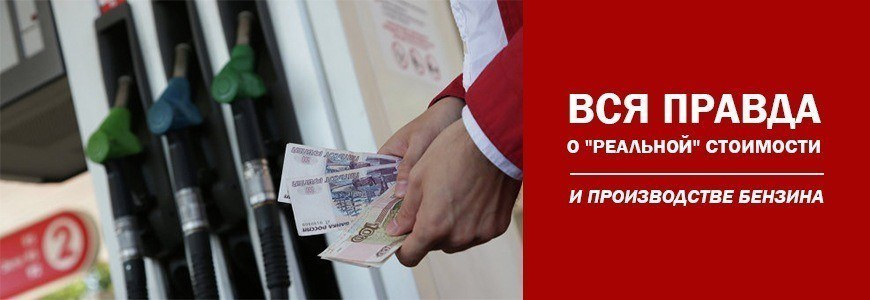The whole truth about petrol production and "real" price of petrol

The petrol pricing mechanism – is one of the mysteries of the global economy. As of 04.04.2016, the most penny petrol is sold in Kuwait – you need to pay only USD 0.23 for one litre. The most expensive fuel is in Hong Kong – about USD 1.81 per litre (GlobalPetrolPrices). The market price of petrol is always shaped by a number of factors: extraction, refining and transport of petrol.
Petrol production technology
The basic components of petrol – are natural gas, refined «black gold», coal, peat, carbon monoxide and hydrogen synthesis products. Over 20% of the oil produced is used to produce petrol. If it were possible to pour oil directly into the tank, it would simplify the task of calculating the cost. But, unfortunately, this cannot be done, because oil is made up of hydrocarbon compounds that differ in their atomic mass.
The production of petrol can be broken down into several stages:
- The initial processing of petroleum. Petrol can only be extracted through complex chemical processes. The liquid is heated to 370 degrees centigrade, which causes condensation of molecules of different weights. The heavier molecular compounds settle to the bottom, while the lighter ones rise to the top. Subsequently, it is from such light compounds that petrol is obtained.
- Retreatment of «black gold». At this stage, the liquids obtained as a result of the first stage are processed. In this way, petroleum products suitable for sale are obtained.
- Re-processing
- Each of the groups of liquids undergoes additional purification.
All refineries are equipped with laboratories, where the resulting petrol is tested for at least 3-4 hours. It is an interesting fact that only about 72% of the final product can be obtained from 1 tonne of oil. The rest – fuel oil. Out of this 72%, 24% of petrol, 49% – is gas, diesel and aviation oil.
What is the «real» cost of petrol
Scientists from all over the world have been calculating the «real» cost of petrol for many years. And no one can unequivocally say what its price depends on.
Most of the researchers of this problem emphasise the following parameters, which directly or indirectly affect the cost of fuel:
The following parameters are the most important ones.
- oil production and transport costs, the final cost of oil;
- transport costs for petrol;
- refuelling station costs (VAT, excise duty, mineral extraction tax).
If you think about it and calculate it, we overpay about 55% of its initial cost.
There are still cars in the world that run on A-80 and A-76 petrol. But still, most new cars «eat» fuel of Ai-95, Ai-92 category. The higher the octane number of petrol, the better it is refined and the more complex its production, which means that the cost is significantly higher.
Despite all the factors that affect the price of petrol, Russian experts agree that the fuel could be much cheaper. One of the leading problems, they argue, is that the mineral extraction tax is tied to oil prices. And if the tax were lowered, the cost would definitely change for the better.
Another problem affecting the cost of petrol — is outdated domestic technology of oil refineries. It will take about 5 years and over $500 million to reconstruct them. For example, in the USA 1 tonne of oil produces 420 litres of petrol, while in Russia only 140 litres. The Union of Oil Producers believes that domestic oil companies can be interested in modernisation by providing tax benefits to companies that will invest in new technologies.
We recommend to get acquainted with the full list of equipment for service stations.








